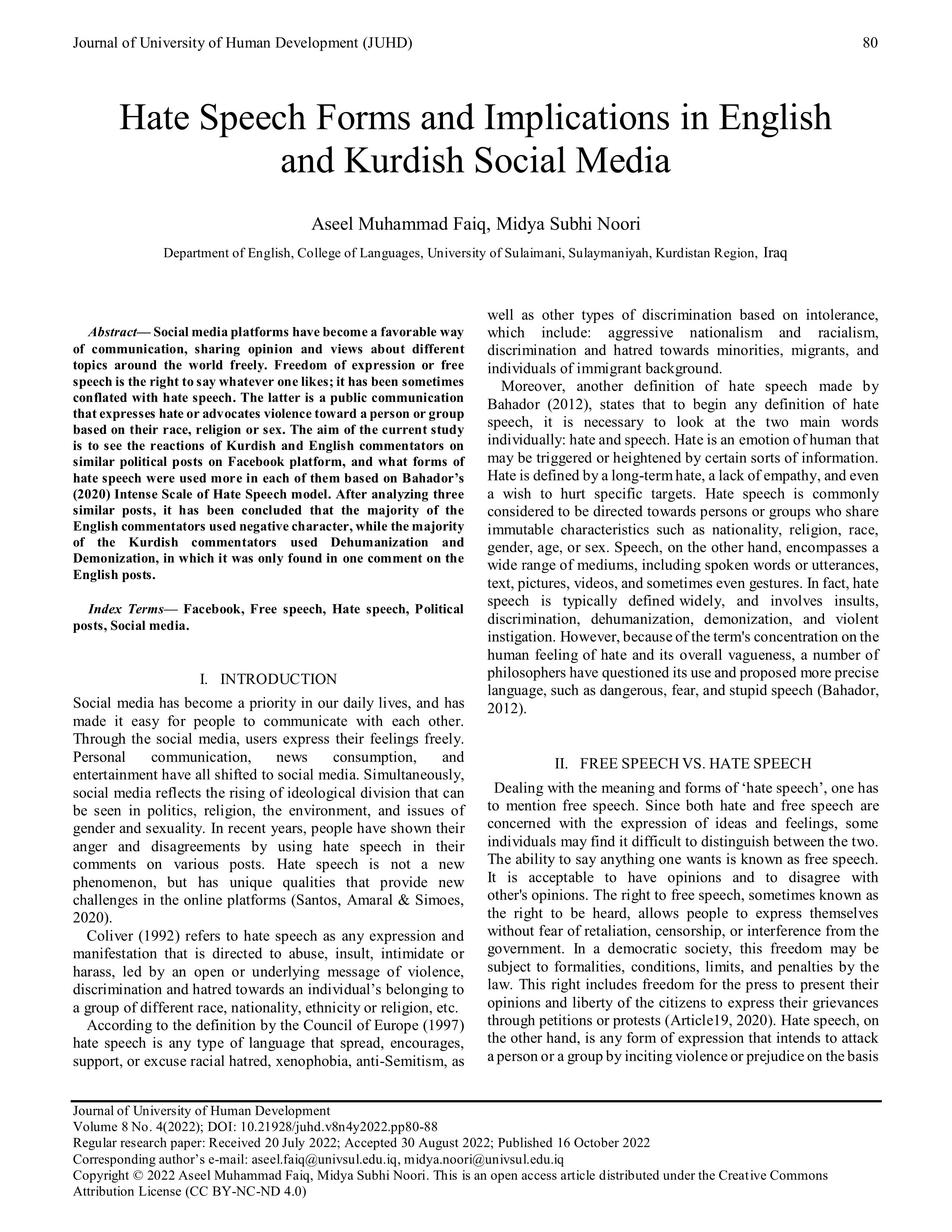Hate Speech Forms and Implications in English and Kurdish Social Media
DOI:
https://doi.org/10.21928/juhd.v8n4y2022.pp80-88Keywords:
Facebook, Free speech, Hate speech, Political posts, Social mediaAbstract
Social media platforms have become a favorable way of communication, sharing opinion and views about different topics around the world freely. Freedom of expression or free speech is the right to say whatever one likes; it has been sometimes conflated with hate speech. The latter is a public communication that expresses hate or advocates violence toward a person or group based on their race, religion or sex. The aim of the current study is to see the reactions of Kurdish and English commentators on similar political posts on Facebook platform, and what forms of hate speech were used more in each of them based on Bahador’s (2020) Intense Scale of Hate Speech model. After analyzing three similar posts, it has been concluded that the majority of the English commentators used negative character, while the majority of the Kurdish commentators used Dehumanization and Demonization, in which it was only found in one comment on the English posts.
References
Article19 (2020). ‘Hate Speech’ explained: A summary. Retrieved May10,2022,from https://www.article19.org/resources/hate-speech-explained-a-summary
Bahador B. (2020), Classifying and identifying the intensity of hate speech. Retrieved August 28, 2021, from https://items.ssrc.org/disinformation-democracy-and-conflict-prevention/classifying-and-identifying-the-intensity-of-hate speech/?fbclid=IwAR17n7gXGAy3gradzM4jS9jmyVz3VIuW0Qv4khTCmkgUKemA0y5JZ67Lpxo
Bahador B. (2012), Rehumanizing enemy images: Media framing from war to peace. Forming a culture of peace: Reframing narratives of intergroup relations, equity and Justice. Palgrave Macmillan. 195–211.
Bogerts, L. & Fielitz, M. (2019), Post-digital cultures of the far right: Online actions and offline consequences in Europe and the US. Bielefeld: Transcript.
Coliver, S. (1992). Striking a balance: Hate speech, freedom of expression and non-discrimination. London: University of Essex.
Council of Europe – Committee of Ministers (1997). Hate Speech. Retrieved August 28, 2021 from https://rm.coe.int/1680505d5b
Jaki, S. & De Smedt, T. (2018), Right-wing German hate speech on Twitter: Analysis and automatic detection. Retrieved October 20, 2021, from http://www.organisms.be/downloads/jaki2018.pdf
Jakubowicz , A. Goodall, H. Martiner, J., Mitchell, T. Randal, L. and Senerierahte, K. (1994), Racism, ethnicity and the media. Allen and Unwin Pty Ltd.
Kibler, A. (2015), The long history of hate speech. History news network. Retrieved October 20, 2021, from https://historynewsnetwork.org/articls/158866
Oboler, A. (2019) Confronting antisemitism in modern media, the legal and political worlds. Retrieved July 5, 2021, fromhttps://opr.degruyter.com/confronting-antisemitism-in-modern-media-the-legal-and-political-worlds/andre-oboler-solving-antisemitic-hate-speech-in-social-media-through-a-global-approach-to-local-action/
O’Sullivan, D. (2019). There are differences between free speech, hate speech and academic freedom – and they matte. Retrieved May 10, 2022, from https://theconversation.com/there-are-differences-between-free-speech-hate-speech-and-academic-freedom-and-they-matter-124764
Parekh, B. (2012). “Is there a case for banning hate speech?” in Michael Herz, and Peter Molnar (Eds.). The content and context of hate speech: Rethinking regulation and response. Cambridge, New York: Cambridge University Press, pp. 37–56
Post, Robert, 2009, “Hate speech,” in Ivan Hare and James Weinstein (Ed.), Extreme speech and democracy. Oxford: Oxford University Press.
Santos, S., Amaral, I, Simoes R., (2020), Hate speech in social media: Perceptions and attitudes of higher education students in Portugal. Retrieved July 20, 2022, from https://www.researchgate.net/publication/340126201_HATE_SPEECH_IN_SOCIAL_MEDIA_PERCEPTIONS_AND_ATTITUDES_OF_HIGHER_EDUCATION_STUDENTS_IN_PORTUGAL
Tsesis, A. (2001), Hate in cyberspace: Regulating hate speech on the internet. San Diego: Law.
Waldron, J. (2012), The harm in hate speech. Cambridge: Harvard University Press.

Downloads
Published
How to Cite
Issue
Section
License
Copyright (c) 2022 Aseel Muhammad Faiq, Midya Subhi Noori

This work is licensed under a Creative Commons Attribution-NonCommercial-NoDerivatives 4.0 International License.


